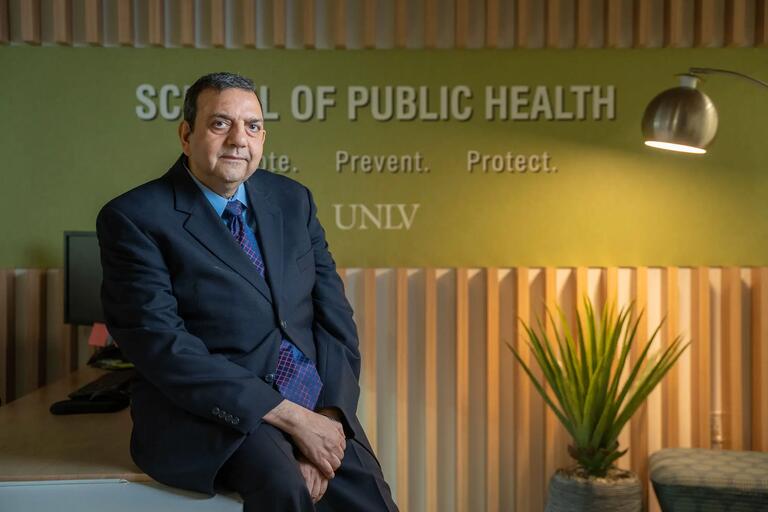Department of Social and Behavioral Health News
Housed in the UNLV School of Public Health, the Department of Social and Behavioral Health consists of faculty who engage in research and develop and evaluate community-based programs that promote health and disease prevention. Our students learn to identify high-risk behaviors or trends in specific populations, as well as propose solutions that aim to improve overall public health in communities.
Current Social and Behavioral Health News

A monthly roundup of the top news stories at UNLV, featuring the presidential election, gaming partnerships, and much more.

News highlights featuring UNLV students and staff who made (refreshing) waves in the headlines.

A collection of news stories highlighting UNLV’s dedication to community and research.

The Outstanding Faculty Award winner has spent over 40 years helping us understand health behavior.

The research expert recently received a $3.5M grant to conduct a study on LGBTQIA+ caregivers of dementia patients and their experiences.

Manoj Sharma receives Community Engagement Award for his work to provide access and delivery of health care to marginalized groups.
Social and Behavioral Health In The News
Glyphosate is a chemical found in herbicides to regulate the growth of weeds and grasses. It is among the most widely used pesticides in the world with applications in agriculture, forestry, and lawn and garden care. Glyphosate (in products such as RoundUpTM) use in the United States has increased rapidly since the introduction of glyphosate-tolerant crops in 1996 and continues to grow.
As the US population ages, geriatric providers face a critical challenge: ensuring that the health needs of LGBTQIA+ older adults — an often overlooked but growing demographic — are not just fulfilled, but prioritized. The National Resource Center on LGBTQIA+ Aging projects that 7 million adults aged 65 and older will identify as LGBTQIA+ by 2030.
Hoarding Disorder is a condition marked by continuing difficulty in discarding possessions regardless of their monetary value due to a perceived need to save the objects. As a result, numerous items accumulate in the household leading to substantial distress and deleterious effects on health, safety, and social and occupational functioning. Since 2013, this disorder has been listed in the Diagnostic and Statistical Manual of Mental Disorders (DSM-V) as a stand-alone disorder while previously it was clubbed with obsessive-compulsive disorder.
Hedonic eating refers to consuming food primarily for pleasure and not to maintain energy balance; eating constantly adds to body weight.
A total of 15 cases of Eastern Equine Encephalitis (EEE) or Sleeping Sickness reported in 2024 thus far in the United States is causing alarm because this disease is very rare in the US. Prior to 2024 the previous cases were in 2015 and were very few. It is a viral disease caused by mosquito bite and can have very serious sequelae. Typical mosquitoes that are infected with EEE include Aedes, Culex, and Coquillettidia. EEE virus is sustained in nature through a cycle between the Culiseta melanura mosquitoes and birds.
Every year the United States reverts its time by one hour in Fall and forward in Spring. This year daylight saving time (DST) ends on November 3, 2024. This shift hurts health in several ways. The impact is more pronounced in Spring and Fall is somewhat less troublesome. However, both time adjustments are problematic.
Social and Behavioral Health Experts


